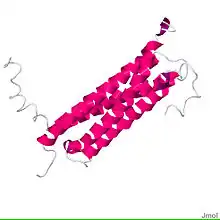CFP-10
| 10 kDa culture filtrate antigen CFP-10 | |||||||
|---|---|---|---|---|---|---|---|
 Structure of the CFP10-ESAT6 complex from M. tuberculosis.[1] | |||||||
| Identifiers | |||||||
| Organism | |||||||
| Symbol | esxB | ||||||
| Entrez | 886194 | ||||||
| PDB | 3FAV | ||||||
| RefSeq (Prot) | NP_218391 | ||||||
| UniProt | P0A566 | ||||||
| Other data | |||||||
| Chromosome | genome: 4.35 - 4.35 Mb | ||||||
| |||||||
CFP-10 within bacterial proteins (also known as ESAT-6-like protein esxB or secreted antigenic protein MTSA-10 or 10 kDa culture filtrate antigen CFP-10) is a protein that is encoded by the esxB gene.[2]
CFP-10 is a 10 kDa secreted antigen from Mycobacterium tuberculosis. It forms a 1:1 heterodimeric complex with ESAT-6. Both genes are expressed from the RD1 region of the bacterial genome and play a key role in the virulence of the infection.[3]
Function
10-kDa culture filtrate protein (CFP-10) is an antigen that contributes to the virulence Mycobacterium tuberculosis. CFP-10 forms a tight 1:1 heterodimeric complex with 6kDaA early secreted antigen target (ESAT-6). In the mycobacterial cell, these two proteins are interdependent on each other for stability. The ESAT-6/CFP-10 complex is secreted by the ESX-1 secretion system, also known as the RD1 region. Mycobacterium tuberculosis uses this ESX-1 secretion system to deliver virulence factors into host macrophage and monocyte white blood cells during infection. In Mycobacterium tuberculosis, the core components of the whole ESX-1 secretion system include Rv3877, and two AAA ATPases, including Rv3870 and Rv3871, a cytosolic protein. The ESAT-6/CFP-10 heterodimer complex is targeted for secretion by a C-terminal signal sequence on CFP-10 that is recognized by the cytosolic Rv3871 protein. Rv3871 then interacts with the CFP-10 C-terminal, and escorts the ESAT-6/CFP-10 complex to Rv3870 and Rv3877, a multi-transmembrane protein which makes up the pore that spans the cytosolic membrane of the virulent host cell. Once ESAT-6/CFP-10 is next to the membrane of the virulent host cell, the CFP-10 C-terminal attaches and binds itself to the cells surface. The ESAT-6/CFP-10 complex’s secretion and attachment to the virulent host cell shows its contribution to the pathogenicity of Mycobacterium tuberculosis. [4].
Structure
The 10-kDa culture filtrate protein (CFP-10) and 6kDaA early secreted antigen target (ESAT-6) complex is a 100 amino-acid sequence protein. ESAT-6/CFP-10 has a hydrophobic nature as well as a high content of α-helical structures. Resonance structure analysis of the complex reveals two similar helix-turn-helix hairpin structures formed by the individual proteins, which lie anti-parallel to each other and forms a four-helix bundle. Its long flexible arm projecting off the four-helix bundle, formed by the seven amino-acid C-terminal of CFP-10, is essential for binding and attaching to the surface of host white blood cells; such as macrophages and monocytes. If this C-terminus is cleaved off, the complex shows greatly reduced attachment ability.
See also
- QuantiFERON
- ESAT-6
References
- ↑ PDB: 1WA8; Renshaw PS, Lightbody KL, Veverka V, Muskett FW, Kelly G, Frenkiel TA, Gordon SV, Hewinson RG, Burke B, Norman J, Williamson RA, Carr MD (July 2005). "Structure and function of the complex formed by the tuberculosis virulence factors CFP-10 and ESAT-6". EMBO J. 24 (14): 2491–8. doi:10.1038/sj.emboj.7600732. PMC 1176459. PMID 15973432.
- ↑ "Entrez gene".
- ↑ Meher AK, Bal NC, Chary KV, Arora A (Apr 2006). "Mycobacterium tuberculosis H37Rv ESAT-6-CFP-10 compleand biochemical stability". FEBS J. 273 (7): 1445–62. doi:10.1111/j.1742-4658.2006.05166.x. PMID 16689931.
Further reading
- DiGiuseppe Champion PA, Champion MM, Manzanillo P, Cox JS (September 2009). "ESX-1 secreted virulence factors are recognized by multiple cytosolic AAA ATPases in pathogenic mycobacteria". Mol. Microbiol. 73 (5): 950–62. doi:10.1111/j.1365-2958.2009.06821.x. PMC 3023814. PMID 19682254.